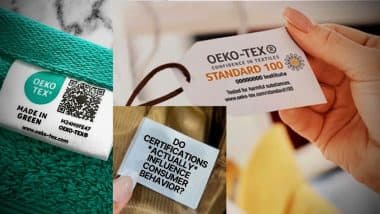Building trust in a marketplace that is increasingly filled with sustainability claims requires a nuanced understanding of both the challenges and solutions at play. While many brands are committed to communicating their sustainability efforts, they may hesitate due to concerns about greenwashing or potential backlash from consumers. This cautious approach often stems from the fear of not meeting consumer expectations or unintentionally misrepresenting their practices. Bamboo Fabric: Is It Truly Sustainable or Environmental Disaster?
One effective way to navigate these complexities is through the use of certifications like OEKO-TEX. These certifications offer a structured approach to transparency and credibility, ensuring that consumers can be confident that products have passed rigorous testing for harmful substances and have been produced using environmentally friendly methods. By bridging the gap between brand messages and consumer scepticism, certifications empower shoppers to make informed choices. When brands embrace these transparent practices, they can build genuine trust and foster loyalty among their customers, contributing to a more sustainable future. Innovative Materials in Jacket Designs: How Biomaterials Are Changing the Future of Sustainable Fashion.
This is particularly important for individuals with sensitive skin or conditions like eczema, as well as those who are mindful of the chemicals in their clothing. By being aware of the dyes, finishes, and synthetic materials frequently present in apparel, consumers can significantly enhance their skin health and overall comfort.
In the ongoing discussion around sustainability, trust is a crucial element that influences how consumers perceive a brand's commitment to eco-friendly practices. Many consumers approach sustainability claims with a sense of cautious curiosity, seeking authenticity in the messages brands convey. To establish a trustworthy relationship, brands must prioritize genuine transparency and accountability. Without this foundational trust, even the most well-meaning sustainability initiatives may be viewed as mere marketing strategies, potentially hindering progress towards a sustainable future.
International certifications like OEKO-TEX play a pivotal role in this landscape. They ensure that textiles are devoid of harmful substances that could endanger human health and the environment. Through thorough testing and verification processes, OEKO-TEX empowers consumers to make well-informed decisions about the safety and sustainability of their clothing and fabric products, reinforcing their confidence in these textiles.
In an era marked by scepticism and a growing emphasis on sustainability, certifications serve as essential signals of trust for consumers. They help confirm that the products chosen genuinely reflect ethical values and responsible practices. However, a significant question persists: do consumers trust these certifications when making purchasing decisions, or are some sustainability claims simply sophisticated forms of greenwashing intended to mislead well-intentioned shoppers into believing they are choosing environmentally responsible options? Exploring this question can further enhance our understanding of consumer behaviour in the context of sustainability.
(The above story first appeared on LatestLY on Feb 21, 2025 05:29 PM IST. For more news and updates on politics, world, sports, entertainment and lifestyle, log on to our website latestly.com).













 Quickly
Quickly





















